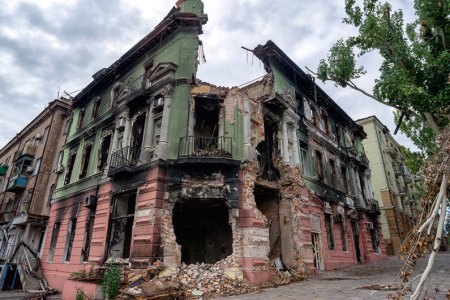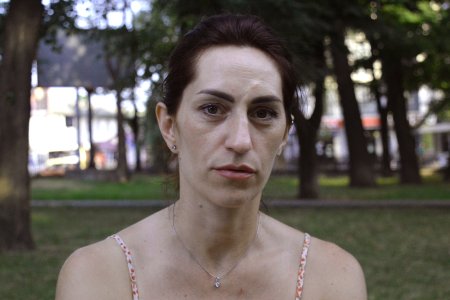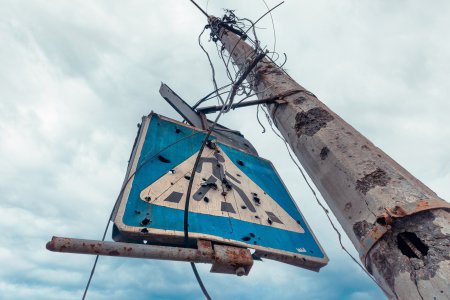— My name is Katia, I am thirty-one years old and until recently I lived in Mariupol, Donetsk Region. I was born there, grew up there, never left it.
It all started in 2015 when they shelled the right-bank district of Mariupol, the eastern part of the city. That’s where I lived. There were rocket hits in the nearest appartment block, the windows in our appartment were blown out. The balcony and the appartment block were completely broken.
My family was in the house at the time, but all alive and well. But when we went to the window, I saw shells hitting shops, I saw a shell hit a kindergarten. We were bombarded with “Grads” at that time. It’s impossible to convey my emotional state.
I was pregnant with my second daughter; now I have three daughters. They are three years old, six years old and eight years old. My first daughter was one year and one month old — at the time of the shelling. So I was pregnant, it was all very nerve-wracking and very hard to go through emotionally. Thank God that everyone in our family was alive and well. At that time over thirty people were killed and a lot of people were injured. There were already dead people lying in the streets, their bodies were just covered up with something. Then the Azov Battalion arrived immediately to help, an ambulance arrived, the firemen came. Because the appartments were on fire. The shops were on fire too.
I came out of the appartment just half an hour after the shelling had stopped, I saw it all, I heard it all... People were also coming out, scared. The children were taken into the basement because the families were very worried about the second attempt of a possible shelling. We had an immediate blackout, actually half an hour before the shelling, the electricity, water and communications were off. We had no communications at all around the city. After the shelling, all communications were switched on already in the evening or the next morning.
At that moment there must have been a revolution in my mind that in the twenty-first century a sleeping area of the city where there is nothing important or so — just houses where people live — can be shelled without any reason or explanation. That’s all.
We didn’t leave the city or our district, we weren’t running anywhere. At that moment. Because it seemed like we had an army. After that there were already organized checkpoints, not far from us, so we knew we were protected. Shops and everything else worked. In a few days everything was fine, everything worked. But mentally it was very difficult. We ran to our relatives after the shelling to find out that everyone was alive, safe and healthy.
— Tell us about the first day of a full-scale war. How was it for you?
— On February 23, 2022 there was the first sign for us: Putin had signed a law recognising the so-called “LPR” and “DPR”. And that he would help them. And then on the twenty-third (of February), in the evening, at ten o’clock in the evening we went to bed in some kind of very strong excitement. We were really worried what would happen next. Because since 2014-2015 we knew that he (Putin) needed Mariupol, it was a land route to Crimea. We knew that we were standing in his way, that he would need it. But no one thought it would come to this.
And on the twenty-fourth, at about half past four in the morning, I heard that there was a battle somewhere very close to us. But for the past seven or eight years we always had battles not so far from us. We were kind of used to it, we didn’t feel any danger.
I heard that battle at night, we closed the windows and went back to sleep. I mean, I wasn’t worried or scared. And then at half past seven in the morning, my mother called me — she works on the outskirts of eastern district, on the border with Novoazovskiy district — and she told me that there was a lot of military equipment behind the shop, there were tanks and APCs (armoured personnel carriers). There were a lot of soldiers. She told us not to leave the house.
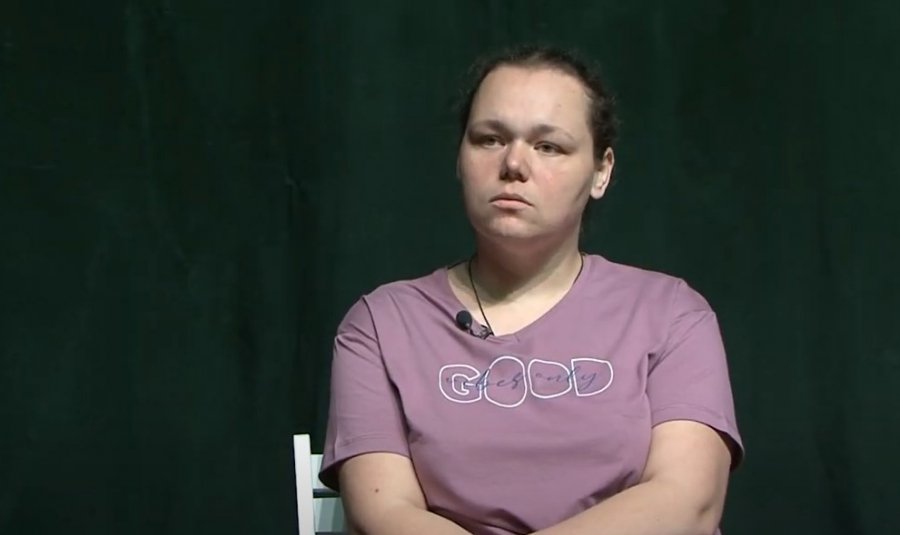
— What happened in the following days?
— My mother told me not to go out, and it was Thursday, a working day, my child had to go to the kindergarten, my alarm clock was on, so I was prepared to take my child there. So, my mother called and told me not to go anywhere. We all stayed home.
And then it became already clear that a war had indeed started, we read it on the Internet. We still had electricity, all communications worked. The war had started, we saw that an invasion had started all over Ukraine. Kyiv was shelled, Kharkiv and the main Ukrainian cities were shelled too. There were strikes on all military bases, Ukrainian airports were almost completely damaged.
And then there was some kind of revolution in my head, because this is the twenty-first century, diplomacy exists. And we are at war. How? How can this happen?
We were home from the twenty-fourth to the twenty-eighth (of February). First of all, during that period of time we were home, we didn’t go out at all, I taped up the windows for safety, as everyone recommended. I put the children’s mattresses at the balcony between the windows. Because if window glass flew out, I realised that the mattresses would save us somehow. So, we were at home, we didn’t go out anywhere.
On the twenty-fourth and twenty-fifth in the morning we still had electricity, water and gas. There was no heating. The heating was turned off immediately on the twenty-fourth (of February). So, there was no heating. And on the twenty-fifth in the evening we were left completely without electricity. There was water and gas. Heavy shellings started, probably, on the twenty-seventh or twenty-eighth (of February). And there were shellings on the first (of March). Those were three days when there were battles close to us.
The women (neighbours) told that the window glass flew out at school No. 69 on the outskirts of our distrcit. There were rocket attacks very close to us. We sat on the floor and counted — so, a rocket was coming, we started to count seconds in order to understand how far from us it would land. How close it would come or fly over us — we worried a lot about that too.
We hid in the inter-apartment partition, sat on the mattress, I put the children on the mattress and covered them with blankets. And they just sat and prayed. We learned it with the kids... My child was three years old and she learned the Lord’s Prayer in half a day. She sat, prayed and repeated after us.
On the twenty-eighth in the evening and the first (of March) in the morning and evening there was very heavy shelling, we were sitting in the partition — we didn’t even get out of it. On the first (of March) in the evening I called my husband and told him that we had to do something.
And telephone connection was only between the eighth and ninth floors of our appartment block, particularly on the landing. That was the only place where you could call. I called my husband and told him that we had to leave because it was very hard emotionally to hear that all — the way the glass flew out, other horrible sounds, etc...
And he said that someone would come and pick us up by car. And on the second (of March) in the morning we were getting ready, we wanted to pack our belongings, we fed the children, we cooked breakfast, we sat drinking coffee and a very heavy shelling started exactly in our residential area. There were shellings exactly on the appartment blocks where people lived. The rockets hit the blocks. I went out to my neighbour’s appartment, the children were sitting in the partition, all the windows were opened in my appartment and the doors were opened as well because of the very strong vibration and blast wave.
I went to my neighbour’s appartment, her window was also opened, I went to open my window, looked out, and I saw three appartments in the appartment block opposite me being hit by rockets in front of my eyes. Those appartments were located on the ninth, seventh and first floors.
People were going down into basements in appartment blocks, it was obvious — they were hiding just in those blocks, and we were just sitting in the partition and worrying. And that was it.
And that battle literally lasted more than an hour. It was very hard, active and intense. The battle was crazy. There were hits just everywhere. Rockets were falling everywhere.
And in an hour — apparently our guardian angels took care and protected us — the car that was promised to save us came to pick us up. My husband’s boss — my husband worked at “Azovstal” (metallurgical facility) as an electrical engineer — came to pick us up. They were also hit hard by that shelling, their car was hidden near the appartment block, at the back of it. Near the ATB-Market (Ukrainian supermarket chain).
And they stayed waiting for us, they saw all the shelling, all the consequences of that shelling. And when they knocked on the door and said they had come for us, there was so much emotion and there were tears and joy. The children were dressed, with their jackets and boots on, and they just ran out and got into the car.
I packed the food I had, I took everything, took the blankets, pillows, money, our documents, literally it was one bag with things we had managed to collect. There were warm socks, children’s tights, leggings, stuff like that. And we just got into the car and drove off. We drove and we could still hear the banging in the area behind us, but we saw only the consequences of what had happened.
We drove through the whole city, all the way to “Azovstal” — all the roads were completely damaged. Completely all of them — there was not a single part of any road that was safe. There were shell craters everywhere, there were even shells sticking out somewhere... Unexploded shells. Just like that.
We reached the bridge — it was the central bridge that connected the two banks of Mariupol across the river. The military checked us and our documents, saw that we had children with us and let us through.
We came to their (the boss’es family’s) house situated in Primorsky district, it was not far from “Thousand Little Things” (a local shop), actually ten to fifteen minutes’ walk from the city centre. So we came there, they had electricity, gas and Internet — it was so wild for us because we were for a week without light, without anything, and then you arrive and you see that people are walking peacefully in the city centre. They heard that the fighting was going on somewhere over there but they didn’t see it. And that was kind of crazy for me. I could not understand that we were hiding in basements and people there walked and did not feel any danger. I guess many people didn’t think it could reach them, I mean the city centre.
We arrived, everything was fine, we began to recover, the children seemed to come to normal life a bit, they had mobile phones, so they were playing games. Three or four hours later electricity and water supplies in that district either were off. There was gas and that was it. But at least we had drinking water.
There were days when we realised that we had to collect snow. We collected snow, melted it on a fire. We made tea and cooked food using snow. We collected rain water, also we put three-liter bottles everywhere where water dropped in order to collect water all the time. It was cold outside, we practically lived in the basement all the time. We lived in the basement for sixteen days.
We tried to sleep in the house for the first two nights, on the second and third of March when we were there. But when we heard that rockets were close... The children could not gather themselves quickly — they were sleepy, they could not get dressed. And we had to cross the street in order to hide in a basement. It snowed, my children were running in socks towards the basement. And when the childer were safe, I run under fire to the house and took their shoes. I could not take children and shoes both at one time because I was carrying my youngest daughter down to the basement in my arms.
And so from the 4th of March we had our basement fully equipped. We had wooden pallets, we had those blankets and pillows we had brought with us... Children´s blankets — our kids slept on them... Sitting, in a reclining position — it did not matter, they could sleep in any position. There were days when we didn’t leave the basement at all because there were strong battles and our house happened to be in the epicenter of these battles.
On one side, shells were flying out, flying over our house and falling behind the houses nearby. We heard the shells falling on the “Thousand Little Things”. We could hear the rockets whistling, we could see where the volleys were coming from. Because especially in the dark you could see the flash, then the sound, and you could hear where the rocket was falling.
We were standing and trying to figure out which way (the shells were flying). There were the moments when we were sitting in the basement and it felt like (a rocket) was just falling over your head and bursting. Several times we really thought that it had hit the house. But it happened to five or six houses away from us. Not too far away. That must have saved us. Thank God, the rocket did not reach us.
— How did you live during shellings?
— We cooked on a fire, the men had built a kind of barbecue. Thank God we had the wood for that. We found, sawed and gathered wood. In the “Thousand Little Things” we could call for the first few days, there was telephone communication there. There was a Kyivstar phone tower nearby where people could sometimes use their mobile phones to make a call. When we left to that district, on the 4th of March we went to make a phone call, and I couldn’t reach my husband or any of my relatives since morning. Then in the evening we went again, it was important for me to hear that he (the husband) was alive and safe and sound. I got through to him. Then we went back home.
We were cooking on a fire, trying to make some pampushkas (doughnuts, usually served with garlic) because we had no bread.
Our children who had everything, absolutely everything in their lives — toys, food they loved, etc. — suddenly lost absolutely everything...
The men used to go shopping. They managed to buy up some food, they got everything they had managed to buy. They bought different cereals and sweets for the children — the children were very happy. Because it must have been two weeks since the beginning of the war.
Then, probably on the 9th or 10th of March, we went to the “Thousand Little Things” to make a phone call. We didn’t get through. We went back. There was a big part of our route where there was only a school, meaning no houses, nothing where we could hide, no protection. So we had to run across the open field to the fence and reach the area with private houses. And as we were running, we heard a rocket whistle very close to us.
We sat down near the fence, and the fragments (of a rocket) started flying literally half a metre above our heads. We saw them smoking, we could see they were hot. We ran some distance down the road, then stopped to have some rest. We saw where the fragments were falling. I saw the rocket fragments hitting the fifth floor — there were mostly low five-storey appartment blocks — as the fragments were falling on the residential buildings, and how they were catching fire.
People at this point had already started to hide, realising that it was still a danger. It became very scary when the aircraft emerged in the sky. When they started flying at night, we heard the plane, everyone ran out of the houses. I got up from the basement, the children were asleep. To some extent they didn’t feel any danger, because maybe I was next to them. They were asleep, they did not hear when the aircraft came and when it flew away. And we heard the aircraft, and that was a real panic.
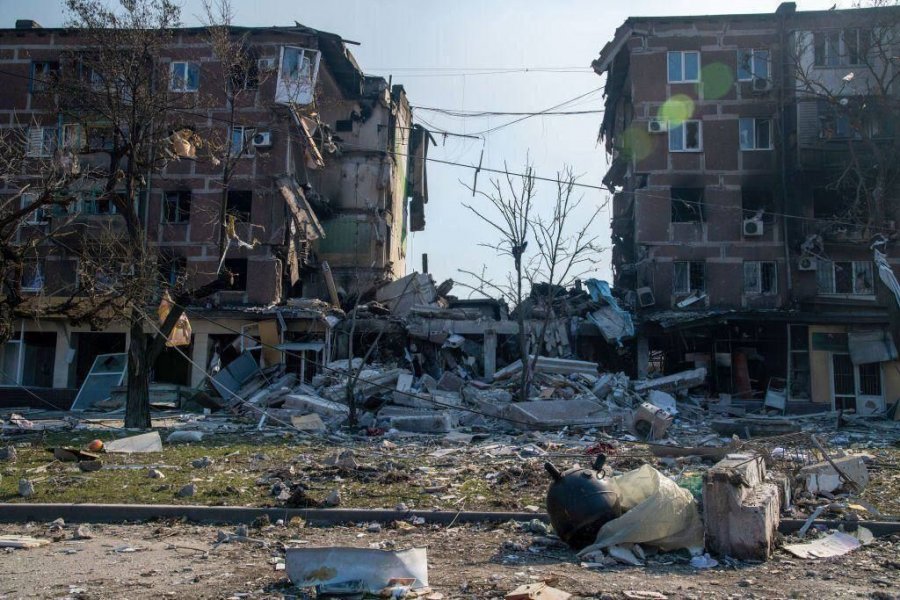
Because it was not known at all where it (the aircraft) would drop the bomb. The airstrikes started, the city centre was constantly bombed. There were times when (we) didn’t leave the house at all because every ten to fifteen minutes we heard an aircraft flying over and we heard shells falling. At that time they started bombing the city centre, there were hits near the City Hospital No. 3, there was a hit at the Central Market, where window glasses flew out for more than a kilometre.
And it happened exactly in the area where the mother of the hostess of our house lived. So she (the hostess) came there just on foot to check on her mother. She did not even have time to change her clothes, so she just came in her home clothes. The next day the men drove in the morning to pick up our warm clothes and documents.
There was a rocket hit on the hospital there too, there were some photos of what had happened. The driver who drove us, Sergij, was showing the photos he had taken from the window. It turned out that there was an appartment block standing there and the city hospital was next to it. He showed a trace of the airstrike... There was a trace, I don’t know, there was really a huge crater, I think even a “KAMAZ” would have easily fit in it and it would not have been even visible there — so large that crater was.
— Have you seen war crimes against civilians?
— In the street there was a man lying on a bench without any signs of life, it was obvious that the man was already dead. A woman was lying on the road too... We tried to walk somewhere between the appartment blocks: when we heard the aircraft, we either ran up to the block or into the block. Because it was not at all clear where the aircraft would fly and drop a shell.
If we heard a rocket, it was clear where it was coming from and in which direction it was flying, but speaking about thr aircraft — well, we could just hear it flying above our heads, we kind of understood that a shell was about to fall somewhere, but it was not clear at all where and in which area it was going to fall.
— How did you decide to leave the city?
— We decided that we had to get out of the city at all costs. On the 20th of March, I called my husband and he called his sister in Yalta (an urban-type settlement in Donetsk Region). It’s not far from Mariupol, about twenty kilometres from the city, maybe thirty. And my sister found a driver who came and picked us up. On the 21st of March we left Mariupol. He (the driver) arrived in the morning, also under shelling, we were sitting in the basement — we didn’t get out. We heard someone started shouting from the street, we ran out just in socks, without any shose. I saw a driver standing there saying: “I am here to pick you up”. We quickly gathered up the children. I had my bags packed, everything was folded, we put the children into the car and drove off.
We were driving along the road, we saw a lot of tanks, a lot of Russian military equipment, and there were tanks hit, broken tanks, you could see that there were also checkpoints, completely destroyed.
On the approach to this Yalta settlement they (Russian troops) checked the documents once, just looked at the children’s birth certificates, looked at the children, they did not check their belongings. They checked just the documents. And we left — and drove into Yalta. And there we spent 24 hours...
We found a driver who was ready to drive us to Berdiansk. I mean from Mangush to Berdiansk... We paid money to him, ten thousand hryvnias (about 250 Euro) for the five of us. When we drove into Berdiansk, there were Russian military personnel all around, all with white ribbons, with those letters “Z” on their tanks and on the vehicles. There were a lot of military vehicles in Berdiansk. We waited in line for a bus all day, but there were no buses at that time...
— How did you manage to leave the occupied territory?
— The convoy (of cars and buses) left Berdiansk at eleven o’clock in the morning and we arrived in Zaporizhzhia at ten in the evening. From Vasylivka to Zaporizhzhia we drove already in dark, it was twillight. And we got under fire. We heard how shells were falling nearby, our convoy was completely stopped. And the convoy was very long. More than four thousand people were leaving that day.
There were fifteen big buses, the convoy was probably three kilometres long, and passenger cars were there too. We were standing for an hour or an hour and a half, maybe. There was no light, everything was completely switched off. We were told to turn our phones off completely, so there would be no geolocation or no geo-tagging turned on.
At one point someone’s phone flashed in the darkness and a woman started saying: “I don’t know how to turn it off!” So people in the bus started shouting at her there just like that! It was really nerve-wracking because everyone was worried.
Shells were falling nearby, we saw them smoking because it’s a field, visibility was very good there, it was very scary. The children were immediately put down on the floor. We sat down on our bags, the women tried to bend down, to bend over and hide somehow.
An hour and a half later we continued our drive. We were let in towards Zaporizhzhia. The military let us in — it was already Ukrainian territory. Our soldiers were already there.
— How did you save your children after that? How did you drive afterwards?
— The conditions, of course, were very difficult. We took a train. We had an “SV”, that mean a compartment with two soft seats-benches, nine people in total were sitting on those two seats. Basically there were eight or nine people in each compartment. No one could lie down, we could only sit.
As many people as possible had to be let (in compartments). At train stations in Zaporizhzhia, only the compartments were occupied. Then people started to sit in the train´s corridors, on bags. Some people were standing. Someone tried to sit on some suitcases.
At night, our children fell asleep on the blankets we had taken from the basement. We have two children’s blankets that we had brought from Mariupol and they are still with us. It’s such a memory that they went through “everything” with us.
The two older daughters, my own and my friend’s, lay on the floor, and the three of us and four other people sat on the seat-bench. My middle daughter laid in my arms at first. It was very difficult for the children. It was hot in the train and they felt nauseous. That drove has taken 24 hours. From Zaporizhzhia to Lviv we drove exactly 24 hours.
We got on the train at 12 pm and we arrived to Lviv at 12:40 pm of the next day. The queues to the tolilets were super long because there were so many people there. It was very bad when the children started vomiting. They started vomiting, there were other bad consequences for their health. We arrived in Lviv, came out of the train station, came to the tent, we were told to go to the administration building and that we would be settled somewhere for a while. So we came to Lviv, out of six children three felt bad because they vomited very badly. Neither pills, nor syrups — nothing helped.
— What do you think will happen in the future?
— We will definitely return to Mariupol, I am sure of that, it will definitely be Ukrainian, our army is very big — we get our lands back.
Kateryna and her three children is already safe abroad. And we all believe that our victory will come soon.
Translation: International Society for Human Rights (German Section)
 The article was prepared by the Kharkiv Human Rights Protection Group with the support of the "
The article was prepared by the Kharkiv Human Rights Protection Group with the support of the "